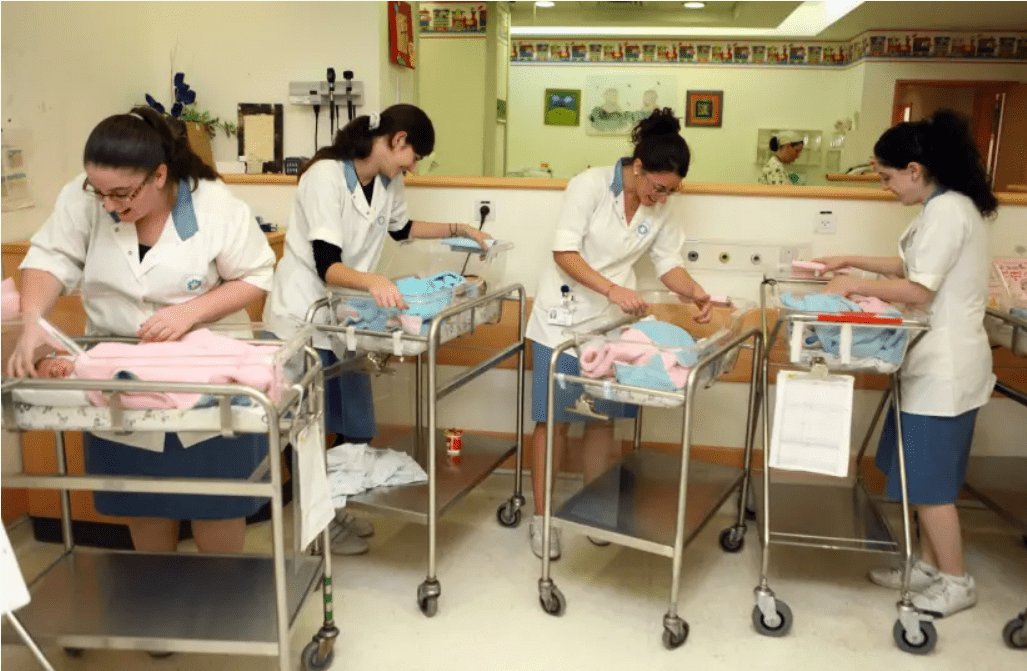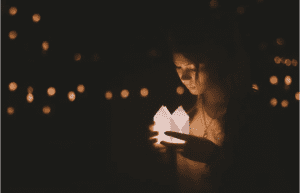Candles of Hope: Helping Israelis affected by pregnancy, infant loss

March 31, 2022 – Jordana Benami, The Jerusalem Post
Candles of Hope was officially registered in 2019 as a kind of one-stop-shop where bereaved families and healthcare professionals can find existing resources and where gaps are filled.
Elysa Rapoport gave birth to a stillborn daughter in August 2016.
In her native Australia, she would have found grief support and information through Red Nose. In the UK, she could have turned to Sands. In the US, organizations such as NechamaComfort, which supports Jewish families and communities through pregnancy loss, infant loss and miscarriage, would have been ready to help.
In Tel Aviv, there was nothing.
“It was terribly traumatic. I couldn’t find what I needed, neither through the hospital nor my health fund. I received one-on-one counseling, but I was looking for a support group,” she says.
Nine months later, her health fund informed her about a support group in Rishon Lezion. Although she found the meetings helpful, Rapoport felt this service should have been available immediately and closer to home.

So she and her mother, Sydney-based early childhood teacher Rebecca Dreyfus, spent the next year-and-a-half working to establish Candles of Hope (candlesofhope.org.il/), a national nonprofit group offering support, information and education to Israelis affected by pregnancy and infant loss.
Their efforts were assisted by Joey Gelpe of Jerusalem, whose second daughter arrived stillborn in 2017.
“We really felt the lack of support and understanding from many parts of society, including the medical establishment,” Gelpe says.
“I felt I wanted to change that as much as I could. The main groups available were for women and I wanted something more holistic. When I heard Candles of Hope was being established, I asked to join the board. At the time I didn’t realize how important it would be.”
Candles of Hope was officially registered in 2019 as a kind of one-stop-shop where bereaved families and healthcare professionals can find existing resources, and where gaps are filled by providing new services.
Its name refers to memorial candles and to the healing power of hope.
“Candles of Hope is an information resource in Hebrew and English – and we want to add Arabic, French, Amharic and Russian to cater to all sectors of Israeli society, because we’ve had approaches from all different communities,” says Rapoport, now the 38-year-old mother of two preschoolers.
“We have a database on our website that lists professional services and support [including English-speaking therapists and counselors], centralizing the information for the first time. There are support groups for men, women and couples, available online, in person or one-on-one,” she adds.
“We are in touch with all the hospitals and health funds, and we lobby the Knesset and Ministry of Health to improve professional training and care at every point along the medical journey of pregnancy loss.”
Despite her limited Hebrew, Dreyfus recruited board members such as Prof. Danny Horesh of Bar-Ilan University’s psychology department, whose research in 2018 found that pregnancy loss can trigger post-traumatic stress disorder (PTSD) and major depressive disorder (MDD).
Although PTSD research in Israel has tended to focus on combat soldiers, Horesh studies how it affects parents of stillborn infants, who account for approximately six of every 1,000 deliveries.
Horesh was among the speakers at Candles of Hope’s first half-day conference in May 2021, which drew 120 online participants. Sadly, Dreyfus passed away shortly before this event she had worked so hard to actualize.
“My mum and I started this together and I continue this work in her honor and memory,” Rapoport says.
The second annual conference, also online to be as accessible as possible, is planned for May 26. The presentations, mostly in Hebrew, will address aspects such as the complex process in the hospital for both the family experiencing the loss and the medical staff; different forms of grief therapy including writing and visual arts; and learning from the work of international support organizations.
“They have a wealth of knowledge we can benefit from, models we can adopt. We have much to learn from them,” says Rapoport.
“We also collaborate with organizations here in Israel that touch on this topic. We do not want to double up on things already happening, but rather bring them together so that people know about them and can access them.”
Before the formal establishment of Candles of Hope, its board was involved in developing a policy that was approved by the Health Ministry and the Knesset, calling for each hospital to appoint someone to deal with stillbirths.
However, says Rapoport, “Nobody is accountable to make sure it’s happening, and in reality it varies from hospital to hospital. We continue to hear stories about unsatisfactory experiences. We are actively lobbying the Knesset for more accountability.”
SHE GAVE a few examples of situations that need improvement.
One issue is that the mother often is placed in the maternity ward with other moms and newborns. The gynecology department would be a more considerate choice, says Rapoport.
Another issue is that before discharge, the woman is required to register the baby’s birth with National Insurance and get a certificate documenting the stillbirth. Rapoport says this hospital procedure is insensitive to women who suffered a stillbirth.
After discharge, these women have no reason to go to the Tipat Chalav baby health clinics, which is where new mothers are routinely screened for postpartum depression.
“A woman who’s gone through a stillbirth falls into a black hole because she’s not in that system. There is no formal mental health follow-up,” says Rapoport. “We are recommending that a screening survey be given to women through their health fund.”
Perhaps the most serious problem is how parents are presented with their rights in terms of the infant’s burial. They receive a form in Hebrew that explains their options: letting the Chevra Kaddisha (burial society) take care of the whole procedure; being notified and included in the burial; being notified only where the baby is buried; or taking the entire responsibility into their own hands, which is preferred by Muslim and Christian families, says Rapoport.
“People are not always given the form, or they’re given it at the wrong time when they’re too overwhelmed to deal with it. And even if they do choose an option, they don’t necessarily get what they request,” says Rapoport. “To this day I don’t know where my baby is buried although I requested that option.”
She notes that the ITIM Jewish Life Advocacy Center is helping bereaved parents get information from the burial societies, but there is no standardization of procedures.
Gelpe says the improvements “can start from small things, like a bit more sensitivity and understanding at the hospitals’ maternity wards. A child who was stillborn is still someone who died.”
He handles many of the administrative tasks for Candles of Hope, aiming to help bereaved families get connected with existing organizations or find someone to talk to who had a similar experience.
And, he says, “we are helping raise awareness about infant loss and pregnancy loss in a society that encourages having lots of children.”
While many services focus only on bereaved mothers, “the men’s experience is on our agenda,” adds Rapoport. Her own partner, she says, “felt sidelined, invisible to the system.”
Candles of Hope cosponsored a men’s retreat and is in touch with another organization that will be providing a hotline for men until its own hotline is set up.
“We have men reach out to us and we provide them with support services. As an organization, we recognize that men experience the loss too. One of our board members, Nurit Glazer Chodick, did her PhD on the fathers’ experiences,” Rapoport adds.
Candles of Hope has never done formal fundraising; it receives support from private donors and from the US-based Good People Fund.
“The fact that Elysa and her family chose to embrace a subject that brought them loss and deep pain, and turn that into a positive force that is changing society is extraordinary,” says Naomi Eisenberger, founder of the Good People Fund, which supports those engaged in tikkun olam (repairing the world) in Israel and the US.
“For far too long, the needs of women who have experienced the loss of an infant or pregnancy were either ignored or treated with little sensitivity. Candles of Hope is changing that reality,” Eisenberger says.





